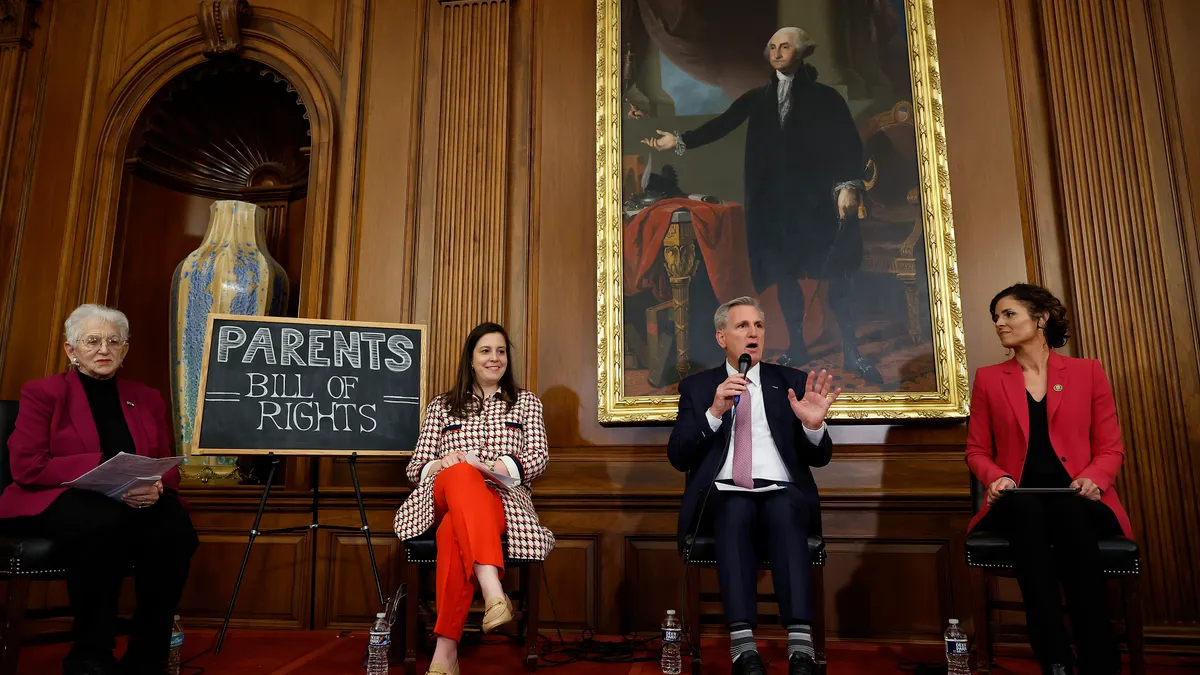Dive Brief:
-
Under a House Republican-led proposal, school districts nationwide would be required to publicly post their curricula, as well as provide parents with a list of library books, according to a fact sheet on the legislation introduced Wednesday.
-
The bill would also require teachers to offer two in-person meetings with parents each school year and bar schools from sharing student data with tech companies without parental permission.
-
In the first half of 2022, 84 bills in 26 states were pre-filled or introduced that would broaden parents' rights in schools, according to an analysis from FutureEd. Many educational professionals, as well as Democratic policymakers, however, say such legislation is not necessary, and that parent involvement has always been and will be encouraged.
Dive Insight:
The “Parents Bill of Rights Act” was introduced with fanfare at a Wednesday event on Capitol Hill by House Republican leaders including Speaker Kevin McCarthy, R-Calif., and Rep. Virginia Foxx, chair of the House Education and Workforce Committee. It currently has 72 cosponsors.
"I know, as all the parents in here know, that children are our greatest blessing and we will do everything we can to help those children succeed," Foxx said.
Rep. Aaron Bean, R-Fla., said there's only a short window for children to stay innocent. "Let's let them learn colors, addition and reading. We don't have time for them to learn anything that's inappropriate," he said.
Some Republicans in Congress, as well as in state and local politics, have been critical of classroom efforts to teach about racial injustice and gender identities or to provide social-emotional learning. There are also claims that parents' involvement has been pushed aside or that parent voice is not respected.
That's not so, said U.S. Education Secretary Miguel Cardona in an opinion article published in Newsweek March 1, the same day the legislation was introduced. Cardona wrote that of nearly 10,000 parents he and his staff have met with over the past two years, none said they wanted schools to be the centers of culture wars or partisan politics.
Among several measures Cardona said the U.S. Department of Education is taking to ensure parents' voices are heard, he said the department is "vigorously enforcing" student and parental rights under federal laws.
National Education Association President Becky Pringle also rejected the narrative that parents' rights are being limited in education decisions. NEA is the nation's largest teachers' union.
"In every community across the nation, parents and educators continue to be partners, working to ensure all students, no matter their race or background, have the opportunity to succeed," Pringle said in a statement.
Pitting parents against educators is harmful, Pringle said. House Speaker Kevin McCarthy, R-Calif., "would rather seek to stoke racial and social division and distract us from what will really help our students thrive: an inspiring, inclusive, and age-appropriate curriculum that prepares each and every one of them for their future."
The National Parents Union, a network of parent organizations and grassroots activists, also condemned the bill in an emailed statement: "This bill has nothing to do with parent rights and everything to do with the radical culture wars that serve as a distraction from what our students’ really need to recover from the pandemic."
However, in a tweet, Moms for Liberty, an organization that promotes the defense of parental rights, thanked the bill's sponsors for focusing on parents' rights at the federal level. "Parental rights are Fundamental Rights that the government doesn’t give you and can’t take away," the tweet said.












